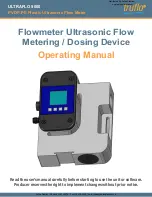
KTM-1000
29
Measuring Torque
Rundown Joint
A rundown joint is offered with the KTM-1000 torque tester for testing power tools. The rundown joint
simulates the tightening of a threaded fastener by allowing the tool to run at free speed before
fastening and shutting-off. Before starting each rundown, reverse (back out) the fastener until it is loose,
but not completely backed out of the thread. Hold the tool firmly, keeping the drive of the tool properly
aligned with the fastener during each rundown.
The rundown joint consists of the following parts:
•
Main body with male square drive and internal thread to accept the rundown fastener.
The square drive installs into the matching female square drive socket of the torque tester.
•
Belleville (spring) washer stack to simulate the action of a joint being fastened.
•
Spacer, roller bearing, and guide bushing to transfer the rotational tightening of the
fastener to the belleville washer stack and main body.
•
Socket head cap screw and corresponding driver bit. The driver bit is installed into the
tool being tested. It is used to tighten/loosen the cap screw during testing.
•
Outer protective cover to enclose the moving parts of the test joint when being used.
Remove the cover to reconfigure the washer stack by loosening the two set screws
at the base of the cover and lifting it straight up. Replace the cover and secure the
set screws before placing the rundown joint into service.
The belleville washer stack in the rundown joint may be
removed and reconfigured to simulate various types of
joints. The 6 washers can be stacked one up/one down
for a soft joint, or nested in groups of 2, 3, or 6 as shown
for harder joint configurations. Please make sure to use
all of the supplied washers to prevent the cap screw
from bottoming out during rundowns. The threads of
the cap screw are lightly greased at assembly. Please
re-apply a light coat of grease as required to maintain
smooth rotation of the cap screw. Discontinue use if
the rundown joint appears to be binding or acting
inconsistently.
Note:
A torque tester used in conjunction with a rundown joint provides a good indication of the
repeatability (capability) of a mechanical clutch power screwdriver. Since the torque output of
mechanical clutch power tools is joint and operator dependent, the actual torque value displayed on the
tester may vary from the final torque of the installed fastener in the workpiece. It is strongly advised
that the user audits the final torque of an installed fastener(s) to ensure that the power tool is set
properly to meet their requirements.
Summary of Contents for KTM-1000
Page 2: ...KTM 1000 1 2 2 3 3 4 4 4 5 6 6 7 8 11 11 11 11 12 12 12 12 13 13 14 14 14 14 15 15 15 15 16...
Page 3: ...KTM 1000 2...
Page 5: ...KTM 1000 4 1 2 KTM 1000 Power Off...
Page 7: ...KTM 1000 6 1 Peak Track 1 2 1 1 3 1 Measure Mode 2 Peak Next 3 Next 4 1 2 USB 3 3 4...
Page 8: ...KTM 1000 7 1 2 1 2 3 SD SD USB USB X 2 Peak Track Graph Clear Track 2 1 3 1 Quick Run 2 3...
Page 12: ...KTM 1000 11 4 System Info 5 Torque Calculator 6 Auto Clear 1 9 Off 7 Sleep Mode 1 40 Off...
Page 13: ...KTM 1000 12 8 Back Light 30 8 Off 9 Language 10 Clock 11 Brightness...
Page 14: ...KTM 1000 13 12 Auto Start None 13 Settings Lock PIN PIN 1234 13 1...
Page 15: ...KTM 1000 14 1 KTM 1000 2 Belleville 3 6 2 3 6 2 3 6...
Page 16: ...KTM 1000 15 1 6 12 2 3...


































